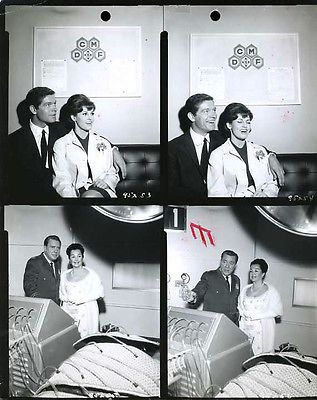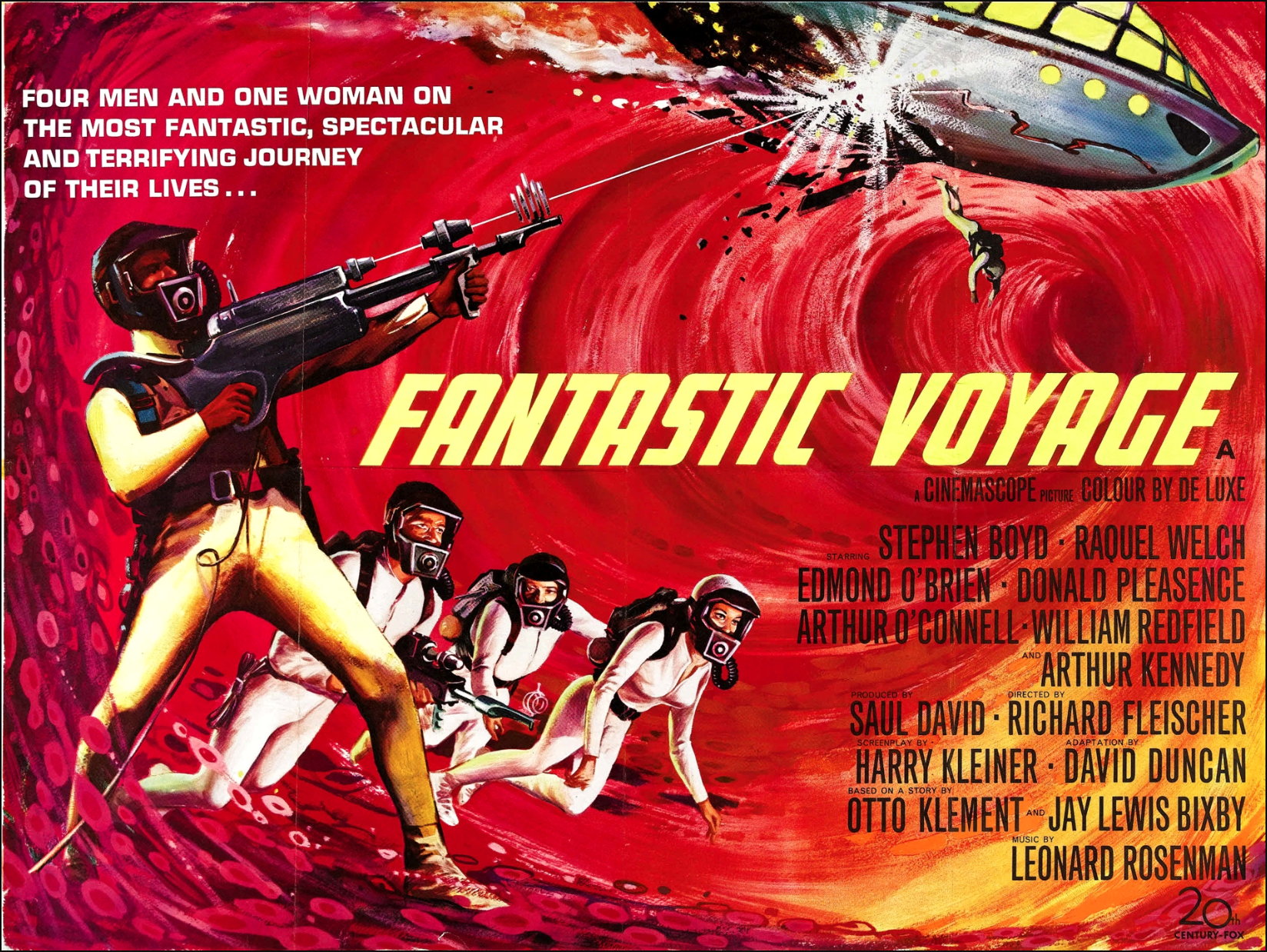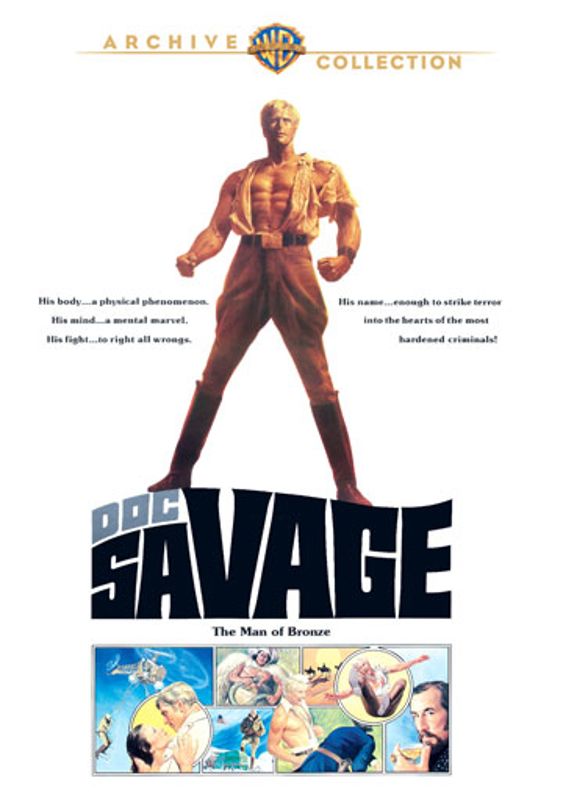Pages
▼
Tuesday, February 26, 2019
From the Archives: McLintock! ( 1963 )
John Wayne's son Patrick is grinning like a cheshire cat in this lovely scene from the western comedy McLintock! ( 1963 ). Also pictured is Yvonne DeCarlo and Aissa Wayne ( John's daughter ). It obviously was a family affair.
From the Archives is our latest series of posts where we share photos from the Silverbanks Pictures collection. Some of these may have been sold in the past, and others may still be available for purchase at our eBay store : http://stores.ebay.com/Silverbanks-Pictures
Sunday, February 24, 2019
On the Set of "Fantastic Voyage" ( 1966 )
"Four men and one woman on the most fantastic, spectacular and terrifying journey of their lives!"
Director Richard Fleischer helmed this classic 1966 sci-fi film about five intrepid individuals who undertake the most fantastic voyage of their lives - a journey through the bloodstream of an ailing scientist. Shrunk to microscopic size, they battle the body's incredible defenses to make a desperate attempt to save his life.
Stephen Boyd, Edmund O'Brien, Donald Pleasance, Arthur O'Connell and Arthur Kennedy all have feature parts but the film became popular primarily due to the presence of the curvaceous Raquel Welch. This exciting adventure features a clever premise of microscopic medical research.... years before nano-technology was even developed!
Let's take a peek at some behind-the-scenes images of the cast and crew during the making of Fantastic Voyage:
 |
| A contact sheet featuring behind-the-scenes images of Stephen Boyd, Donald Pleasance, and Raquel Welch |
 |
| A view of the Proteus Submarine before being miniaturized. |
 |
| Interior view of the Proteus |
 |
| Constructing the "intestines" |
 |
| Ick...the human body can be difficult to travel through! |
Dale Hennesy and Jack Martin Smith were responsible for the art direction of Fantastic Voyage while Stuart A. Reiss and Walter M. Scott handled set decor. Hennesy was also the production designer for Young Frankenstein ( 1974 ) and King Kong ( 1976 ).
| Raquel Welch, taking a breather during filming |
 |
| Raquel Welch pictured in that famous tight-fitting diver suit |
 |
| "Fantastic Voyage" utilized the "blue screen" which was later replaced with graphics of the insides of a human body |
 |
| Ms. Welch posing in front of the screen |
 |
| Another contact sheet, this time with Raquel striking some glamour poses for the photographer |
 |
| A scene with the blue-screen visible in the background.... |
 |
| ...and a similar scene with the graphics inserted. |
 |
| Publicity photo of Stephen Boyd and Raquel Welch |
 |
| A contact sheet of the publicity shots that were taken |
 |
| A costume test photo showing that the film was in production in April 1965 |
 |
| An original ABC television publicity photo |
Thursday, February 21, 2019
The Impossibly Difficult Name that Movie Game
Hmmm....we have here a handsome Indian brave sitting atop a horse. You're probably wondering when was the last time you saw a movie with a shirtless American Indian on a horse, and I'll tell you something, they are not as common as you'd think!
All you have to do is tell me the name of the movie this scene is from ( you don't even have to guess the name of the brave ) and you win this round of The Impossibly Difficult Name that Movie Game!
GAME OVER.
Congratulations to Damsbo for correctly guessing "The Indian Fighter" ( 1955 ) starring Kirk Douglas. This Indian - Grey Wolf ( Harry Landers ) appears within the first ten minutes of the film and is very distrustful of Johnny Hawks ( Douglas ). They will later battle to the death for the life of Wes Todd ( Walter Matthau ).
Saturday, February 16, 2019
Tintin et le Temple du Soleil ( 1969 )
Tintin, the beloved comic book creation of Belgium illustrator Herge, was transferred to the big screen as a fabulous full-length feature film in 1969 - Tintin et le Temple du Soleil. It was based upon one of Tintin's most famous escapades, his search for the missing Professor Calculus and a band of archeologists who are under the spell of an ancient Incan curse. The film took the two-part adventure ( from the books The Seven Crystal Balls and The Prisoner of the Sun ) and condensed it into one 77-minute film.
This was a French production from Belvision studios and the animation is spot-on, matching Herge's style as closely as if the artist himself painted each cel. This isn't surprising, considering Raymond LeBlanc was the producer of the film. LeBlanc was the publisher of the original Tintin magazine series, as well as the founder of Editions du Lombard and Belvision Studios. He was a giant in the Belgium animation industry, much like Walt Disney was here in the States.
In 1957, Belvision brought the Tintin stories to television as an animated serial of five-minute episodes which covered seven of Hergé's most popular books. The success of this series made the studio attempt two animated feature-length films: Asterix the Gaul ( 1967 ) and Asterix and Cleopatra ( 1967 ), both featuring the comic strip character Asterix. These films were great successes and it led them to bring Tintin to the screen.
Tintin and the Temple of the Sun differs only slightly from Hergé's original story, with a few additional scenes added and Thompson and Thompson ( the twin detectives ) getting a much larger role. Like the book series, however, it is filled with adventure and plenty of opportunities for Captain Haddock to lose his temper..."Ten thousand thundering typhoons!!" Beautiful music by François Rauber also enhances the picture.
Three years later Tintin returned for Tintin and the Lake of Sharks which featured many of the same actors voicing the characters. Both pictures are available on DVD in their original French language version and dubbed in English.
In 1957, Belvision brought the Tintin stories to television as an animated serial of five-minute episodes which covered seven of Hergé's most popular books. The success of this series made the studio attempt two animated feature-length films: Asterix the Gaul ( 1967 ) and Asterix and Cleopatra ( 1967 ), both featuring the comic strip character Asterix. These films were great successes and it led them to bring Tintin to the screen.
Tintin and the Temple of the Sun differs only slightly from Hergé's original story, with a few additional scenes added and Thompson and Thompson ( the twin detectives ) getting a much larger role. Like the book series, however, it is filled with adventure and plenty of opportunities for Captain Haddock to lose his temper..."Ten thousand thundering typhoons!!" Beautiful music by François Rauber also enhances the picture.
Three years later Tintin returned for Tintin and the Lake of Sharks which featured many of the same actors voicing the characters. Both pictures are available on DVD in their original French language version and dubbed in English.
Saturday, February 9, 2019
Doc Savage: The Man of Bronze ( 1975 )
Have no fear, Doc Savage is here!
The intrepid Doc Savage and his Fabulous Five journey to the wilds of South America to investigate Doc's father's death in the jungles of Hidalgo. En route, they encounter numerous dangers as the maniacal Captain Seas tries to thwart them as they come closer to discovering his vast treasure of stolen Incan gold.
Doc Savage: The Man of Bronze is a delightful globe-trotting adventure film based on the popular 1930s pulp fiction character. It features some exotic locales, great set design, plenty of excitement, and loads of tongue-in-cheek humor...much in the vein of the original Batman! television series.
Savage is indeed a "man of bronze". He's an American who has Herculean strength, shiny white teeth, perfectly groomed hair, and impeccable manners. He also has the morals of a Boy Scout and would never hesitate to aid an old lady crossing the street. When asked what he would like to be served onboard Captain Seas' yacht he responds, "A Coke, please".
His Fabulous Five are equally honorable and, like typical comic book characters, have a range of capabilities to help their leader in times of trouble. There is Monk, a chemist ( Michael Miller ); Major Roberts, an electrical wizard ( Paul Gleason ); Littlejohn, an archeologist ( Eldon Quick ), Ham, the "brains" ( Darrell Zwerling ), and Colonel Renny, a construction engineer aka "the strongman" ( William Lucking ). Like Doc, these men, devote their lives to traveling around the world for the sake of justice.
Also in the cast are Pamela Hensley as Mona, a love interest for Doc; Carlos Rivas, and Paul Wexler as the diabolical Captain Seas.
The character of Dr. Clark Savage Jr. originally appeared in magazine format in 1933, written by Lester Dent under the pseudonym Kenneth Robeson. The series lasted for 181 issues and was brought to even greater fame in the 1960s when artist James Bama created new cover designs for the Bantam Books paperback re-issues. By the mid-1970s, over 20 million Doc Savage stories had been sold around the world. Hence, he was a fantastic character to bring to the silver screen.
This idea was considered in 1966 after the James Bond films proved to be such box-office attractions. Chuck Connors was to star in the filming of the 1934 story "The Thousand-Headed Man", but the securing of the film rights failed and it was shelved. It was not until 1974 that producer George Pal decided to make a Doc Savage film and obtained both film and television rights with the plans of creating a televised adventure series after the picture was released.
Pal originally hoped to cast Hercules-legend Steve Reeves as Savage. But he changed his mind eventually and selected Ron Ely ( Tarzan ) for the part instead, dying the man's hair blonde for the role. He was an excellent Doc, exuding charm and uttering his campy lines with dead seriousness.
"Mona, you're a brick!"
However, in spite of all its merits, the film bombed at the box-office. The timing of its release was just a matter of ill fortune. This was the mid-1970s and not many people wanted to watch a 1930s-themed adventure film with such goody-two-shoes humor. By the late 1970s, the mood had changed and the similarly campy Wonder Woman did very well on television. Perhaps Doc Savage would have performed better if it was geared towards adults and made into a dramatic adventure flick instead.
It truly is unfortunate that Doc Savage became such a loss for George Pal ( it was the last film he produced ) because, while it isn't a comedic gem, it really is colorful and quite entertaining. So entertaining, that it is disappointing to learn that the sequel ( promised at the end of the credits ) was never put into production! It would have been great to see the follow-up.
The intrepid Doc Savage and his Fabulous Five journey to the wilds of South America to investigate Doc's father's death in the jungles of Hidalgo. En route, they encounter numerous dangers as the maniacal Captain Seas tries to thwart them as they come closer to discovering his vast treasure of stolen Incan gold.
Doc Savage: The Man of Bronze is a delightful globe-trotting adventure film based on the popular 1930s pulp fiction character. It features some exotic locales, great set design, plenty of excitement, and loads of tongue-in-cheek humor...much in the vein of the original Batman! television series.
Savage is indeed a "man of bronze". He's an American who has Herculean strength, shiny white teeth, perfectly groomed hair, and impeccable manners. He also has the morals of a Boy Scout and would never hesitate to aid an old lady crossing the street. When asked what he would like to be served onboard Captain Seas' yacht he responds, "A Coke, please".
His Fabulous Five are equally honorable and, like typical comic book characters, have a range of capabilities to help their leader in times of trouble. There is Monk, a chemist ( Michael Miller ); Major Roberts, an electrical wizard ( Paul Gleason ); Littlejohn, an archeologist ( Eldon Quick ), Ham, the "brains" ( Darrell Zwerling ), and Colonel Renny, a construction engineer aka "the strongman" ( William Lucking ). Like Doc, these men, devote their lives to traveling around the world for the sake of justice.
Also in the cast are Pamela Hensley as Mona, a love interest for Doc; Carlos Rivas, and Paul Wexler as the diabolical Captain Seas.
The character of Dr. Clark Savage Jr. originally appeared in magazine format in 1933, written by Lester Dent under the pseudonym Kenneth Robeson. The series lasted for 181 issues and was brought to even greater fame in the 1960s when artist James Bama created new cover designs for the Bantam Books paperback re-issues. By the mid-1970s, over 20 million Doc Savage stories had been sold around the world. Hence, he was a fantastic character to bring to the silver screen.
This idea was considered in 1966 after the James Bond films proved to be such box-office attractions. Chuck Connors was to star in the filming of the 1934 story "The Thousand-Headed Man", but the securing of the film rights failed and it was shelved. It was not until 1974 that producer George Pal decided to make a Doc Savage film and obtained both film and television rights with the plans of creating a televised adventure series after the picture was released.
Pal originally hoped to cast Hercules-legend Steve Reeves as Savage. But he changed his mind eventually and selected Ron Ely ( Tarzan ) for the part instead, dying the man's hair blonde for the role. He was an excellent Doc, exuding charm and uttering his campy lines with dead seriousness.
"Mona, you're a brick!"
However, in spite of all its merits, the film bombed at the box-office. The timing of its release was just a matter of ill fortune. This was the mid-1970s and not many people wanted to watch a 1930s-themed adventure film with such goody-two-shoes humor. By the late 1970s, the mood had changed and the similarly campy Wonder Woman did very well on television. Perhaps Doc Savage would have performed better if it was geared towards adults and made into a dramatic adventure flick instead.
It truly is unfortunate that Doc Savage became such a loss for George Pal ( it was the last film he produced ) because, while it isn't a comedic gem, it really is colorful and quite entertaining. So entertaining, that it is disappointing to learn that the sequel ( promised at the end of the credits ) was never put into production! It would have been great to see the follow-up.











